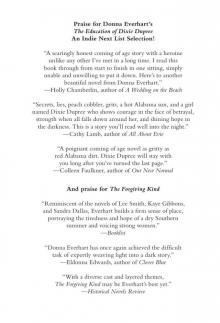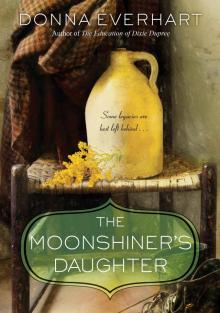- Home
- Donna Everhart
The Moonshiner's Daughter Page 6
The Moonshiner's Daughter Read online
Page 6
Daddy handed it back to Merritt and said, “Take some more.”
Merritt readily obliged, and then Daddy held his hand out for the jar. He motioned for me to get in the front between him and Mr. Naylor. I slid onto the seat, glad to be out of the woods, out of the night air. Daddy and Mr. Naylor got in, and Daddy stuck the jar under the seat. I looked over at Merritt. He wore a tiny smile as he rested, his pain already seeming less severe. I turned back around, ashamed at how I could be so harsh and inconsiderate at times.
Mr. Naylor said, “Where to?”
Daddy hesitated, and said, “That arm’s bad.”
Mr. Naylor said, “Want to get him over to Wilkes General?”
Daddy rubbed at his chin. “I got to come up with some reason. They’ll ask what happened, how he hurt it.”
Mr. Naylor said, “What was it again?”
Daddy went into the account of how we’d been run off the road. He didn’t say by who.
Mr. Naylor said, “Hm. Guess that would only set off more questions. Get some others involved that don’t need to be. Could say it was a farming accident.”
Daddy nodded. “Working on the tractor, fell off.”
Mr. Naylor said, “Yup.”
Daddy said, “That’ll work.”
Mr. Naylor drove like it was Sunday morning, not any faster than twenty-five miles per hour. It took a long time coming down the mountain.
Merritt moaned from the back, and asked, “How much longer?”
“Won’t be long,” said Mr. Naylor, as we poked along.
Daddy handed Merritt the jar again. I commended myself on keeping my mouth shut. Merritt slurped away while Mr. Naylor drove even slower as we made it into the more populated area of Wilkesboro. In town, some paid no mind to what Daddy did, while others relayed a different message: We know what y’all are doing. For shame. For that reason alone, I had never liked coming down off Shine Mountain and into town every Saturday to get groceries. For the past year or so, I’d begged not to be made to go, my humiliation like the weight I carried, easy for anyone to see. Daddy generally sold on 10th Street, where a strange mixture of preaching and prostitution existed. The ones listening to the preaching would sometimes duck into questionable establishments where Daddy’s jars were kept hidden until someone came in asking for “that special drink y’all got.” If I was forced to go into town, I walked behind Daddy and Merritt, stared at the ground in front of my feet. Daddy said I was going to walk into a light pole, or a wall, one of these days. He couldn’t see my embarrassment. He couldn’t see it, or it didn’t matter.
On Main Street we passed by the federal building and post office where I’d heard the government had set up a revenuer’s office for Wilkes County, and where a slew of agents had been sent to try and catch all moonshiners and bootleggers, but tracking down people who didn’t want to be caught wasn’t easy. No one could see that it had made much difference. From there we went across the Yadkin River into North Wilkesboro. We went by Pearson’s wholesale grocery where Daddy would get milk, bread, eggs, and cigarettes on them miserable Saturdays. Finally, we came to Wilkes General Hospital.
Mr. Naylor said, “Want I should pull up to that there entrance?”
Merritt burped while Daddy stared at the brightly lit building and sucked hard on his cigarette.
He blew a stream of blue smoke out of the cracked window, and said, “Yeah. I reckon that’s where we ought to go.”
For the first time in my life, I believed I heard a hint of nervousness in his voice. Mr. Naylor eased up to the door and put the vehicle in Park. Daddy finished his cigarette, and got out. I scooted across the seat after him and got out too.
He leaned down to speak to Merritt, and said, “I’m going in and see if I can find somebody to look at that arm.”
Merritt, his color gone from white to an unhealthy-looking flush with eyes bright and glassy, didn’t respond. Daddy acted like he was deciding something, and he finally turned and went inside where the large windows of the entrance showed him looking around for help. It didn’t take long before a nurse approached. Daddy gestured toward the car, at where I waited on the sidewalk. Merritt had propped up on an elbow and grinned stupidly. I glared at him, then turned back to see what was happening.
Mr. Naylor said to no one in general, “You think she’d be a little quicker.”
He was one to talk.
Merritt slurred, “It’s all right. I’m feeling purty good now.”
The nurse disappeared and came back pushing a wheelchair. Daddy held the door for her and in a matter of seconds she was beside the car’s back door, locking the wheels. She was all business, barely sparing me a glance before she leaned down, and studied Merritt’s wacky-looking arm.
She said, “When did this happen?”
Merritt was vague. “Not long ago.”
She said, “What’s your name?”
He wore a lopsided grin and said, “Ish Merritt, ma’am.”
I wanted to be anywhere but here. It was evident he was three sheets to the wind. Daddy shoved his hands in his pockets and paced.
The nurse said, “It’s going to hurt some getting you into this chair.”
Merritt said, “Naw, ma’am, it ain’t. Not now.”
Daddy came forward and said, “Here, I’ll help him.”
He motioned at Merritt, who apparently no longer had an issue moving out of the back seat. It didn’t seem to bother him one bit as he shifted with Daddy’s help into the chair, his arm resting in his lap, all wrong-angled. The nurse grabbed the two handles at the back and whisked him toward the hospital’s door.
Daddy said, “Marty, thankee kindly. Go on home. I’ll bring what I had for you another night.”
We hurried to follow the nurse as she breezed by the desk where another lady sat writing in a ledger.
The nurse said, “Let Doctor Barnes know we’ve got a serious arm injury.”
The woman immediately picked up a phone, held it to her mouth, and spoke. Crackly speakers overhead blasted, “Doctor Barnes, treatment room one. Doctor Barnes, treatment room one. Stat.”
We had to walk fast to keep up, and soon we stopped at some double doors.
She said to me, “You have to wait here.”
Daddy handed me a couple of dimes and said, “Call your uncle Virgil. Tell him to come get us.”
I took the change and watched as the nurse took Merritt beyond the double doors.
Daddy said, “We’ll be out soon as we can.”
The doors closed after them, and a few seconds later an elderly-looking man in a white coat with a stethoscope slung around his neck went through them and I took him to be Doctor Barnes. I tried to see if I could see Merritt and Daddy before the doors closed again. The hall was empty. I walked back the way we’d come, looking left and right for the pay phone. I found one a minute or so later inside a small metal box hanging on the wall. All around it were dirty messages, the names of girls who would apparently do this or that, if you called them, along with the so and so was here types of scribbles. I put a dime in the slot and dialed Uncle Virgil’s number. It rang six times and I was about to hang up when Aunt Juanita answered.
She shouted an irritable, “Hello!”
That followed what sounded like a pot being thrown on the floor. I swallowed, my throat about to close up, and not allow me to talk.
She said, “Whoever this is had better speak up. . . .”
I choked out, “Hey Aunt Juanita, it’s Jessie.”
“Jessie. What is it, why are you calling?”
I imagine it wasn’t natural seeming, getting a phone call from me.
“We’re at the hospital. Merritt hurt his arm.”
She said, “Good Lord. You okay? What about your daddy?”
“I have a knot on my head, but Easton is all right. Our car got run off the road.”
She said, “Wait a minute.”
A scraping and rustling came through the earpiece as she passed the phone to Uncle Virgil. Before he
spoke, he coughed, a hoarse hacking that rattled my ear. I held the receiver away until his voice, sounding like a buzzing bee in a tin can, came through.
I put it back to my ear in time to hear him say, “What happened?”
I spoke in a low voice even though I was the only one in the hall.
“Daddy and us, we were on a run, on that road where you said there’d been agents. A car started following us. It ran us off the road, and then pushed us over the side. I think we rolled a couple times. Easton said it was Murrys.”
Uncle Virgil coughed again, and said, “Damn.”
I waited and there came a long stretch of silence.
He finally said, “Juanita said Merritt’s hurt?”
I said, “Yeah. We’re at Wilkes General.”
“What’s the doctor said?”
“Nothing yet. I’m waiting to find out. Daddy wanted you to come get us.”
“Let me get dressed and I’ll be there quick as I can.”
He hung up without saying good-bye. I walked back the way I’d come and found two chairs in the hallway near the double doors. I sat in one of them, jiggled one foot, then the other. After a while, I noticed mud, bits of grass, and other debris from my shoes sprinkled over the shiny, clean waxed tile. This fit my general attitude at the moment, like I had no right to be sitting in this clean place operated by people who made a living by doing fine and upstanding jobs, people who were valued. Like the nurses I’d seen with their white dresses and shoes, pristine uniforms of mercy and kindness. I stared at the floor again, at what I’d left, and thought of what I’d read earlier on the wall by the phone. What was on the floor said, Jessie Sasser was here, without me having to write it down. I moved one foot and tried to scrape the mess out of sight. More fell and I gave up.
Before long, I began to realize how hungry I was. The peanut butter sandwich and milk was long gone. My stomach rumbled, protesting its vast emptiness. It was like my belly had a demon in it, growling at me. I only had the one dime left. I doubted it would be enough to buy anything from a vending machine, if they even had one. I got up and drifted down the hall again, passing by doors that said: “Janitor,” “Men’s Bathroom,” “Women’s Bathroom,” “Supply Closet,” and directions to other parts of the hospital. I found nothing, so I walked back the way I’d come, sat back down in the chair, and waited. Time slowed to a crawl, while I preoccupied myself trying to count each square of tile I could see without getting up. The doors finally swung open.
Daddy came out first; the doctor followed close behind, saying, “I can smell it, and see it. The boy is drunk.”
“If’n he is or isn’t ain’t none of your business.”
The nurse came next with Merritt, his arm swathed in a huge white plaster cast almost to his shoulder. At least it had a slight bend in it. He wasn’t grinning now, his color gone gray. The doctor left quick as he’d come. Daddy evidently wanted to explain the situation to the nurse, and he gestured at Merritt.
He said, “He had a little bit of something to help him with the pain until we could get here is all.”
The nurse waved a hand and said, “You don’t need to explain. My own granddaddy and grandma loved to sip the fruit bitters for what ailed them now and then. Doctor Barnes isn’t from around here. He doesn’t understand. This young man’s going to be in some pain as the days go by, but the doctor’s given me a prescription for you to fill.”
Daddy said, “Where do I pay?”
“We’ll send you a bill. He’ll need to come back—”
Daddy cut her off. “We ain’t coming back.”
“He’ll need to get that cast off.”
“I’ll see it gets taken off.”
She didn’t say another word. She wheeled Merritt back to the entrance we’d come in off the parking lot. The nurse gave Daddy a piece of paper just as Uncle Virgil came through the doors looking like he’d been in a fight with the ground. His pants and shirt were rumpled, and his eyes bloodshot. We made our way out to his car and I imagined to her we looked like a rough lot. I considered my family, and turned inward, assessing my own self.
My conclusion, A rough lot, to be sure.
Chapter 6
On the way home Uncle Virgil and Daddy talked about retaliation. Merritt sat hunched against his door while I leaned my head against the window, eyes closed and listening.
Daddy said, “First I’m gonna have Troy get his wrecker and haul Sally Sue back over to the house where I can get her fixed back up.”
Daddy trusted Troy Dalton because he’d go get his car, no questions asked.
Uncle Virgil said, “I can do the routes if’n you need me to.”
Daddy pulled hard on his cigarette. “I’ll see what calls I get. Everyone got what they needed only a couple days ago.”
Uncle Virgil said, “What’re we gonna do about it?”
“I got to think on it, but you can bet I ain’t gonna forget it.”
“Maybe I should try and find out where they got a still.”
“It could be useful.”
Uncle Virgil grunted. He dropped us off and since it was late, he didn’t stay. Merritt wobbled inside, and immediately went to his room. I trailed after him and watched as he sat carefully on the bed, grabbed his extra pillow, and then laid back using it to prop his arm up. His mouth was a straight line, his eyebrows lowered so he didn’t have to look at anyone. It was starting to dawn on him how hard it might be for the next few weeks. No ball games. Merritt held distant dreams of maybe being a major-league player, and for as much as he liked pitching, I’d seen the difference when we worked a still. He played ball, and he was good, but the way he talked about making and hauling liquor, it was like his destiny. There would be none of either for a while.
Daddy came into the room with a glass of water and set it on Merritt’s nightstand. He was in a begging mood apparently.
He motioned at the glass. “It ain’t gonna do me no good. My arm’s already killing me again. Can’t I please get me some more of that hooch?”
Daddy ignored him and I was glad.
He said, “Take these.”
He dumped some pills in Merritt’s hand. Merritt gaped at his palm with disappointment, then took them. I hovered in the doorway, and when Daddy went by, he shook his head, warning me against anything I might have to say. I was empty though, in more ways than one. What had happened to us fastened around me like when I tightened my belt to keep my stomach from hurting. We could’ve all been killed and no one would have found us for days. He went down the hall into his room and shut the door firmly, letting me know he was done for the night.
It was just as well.
I went into the kitchen. I didn’t turn on the light as I reached for the refrigerator handle, the peace of the house reassuring me I was safe. I opened it and the light inside came on, throwing out a half circle of brightness around me. I visualized one of them seeing me there, ready to point and laugh. I hesitated, then grabbed the beans, hot dogs, biscuits, the bottle of milk. I shut the door, and with the light gone, I let out a sigh. I didn’t think about what I was about to do. I pushed my negative thoughts aside as I lifted the tinfoil off the bowls, the crinkling sound loud to my ears. I waited a moment, then unwrapped the biscuits from the wax paper. I could see myself getting drunk off food like Merritt had gotten drunk off the liquor.
It began like it always did. I would start slow, chewing with care, until an urgency overtook my methodical approach. It happened when there came this need to fill what was barren, satisfy a void that belonged not to regular hunger, but to something else. It compelled me on, go quicker, quicker, as if my body was only this chasm, the hole in my middle always there, always growing until I was overtaken by it. Even I understood this wasn’t entirely about food. No. No matter how much I ate to try and rid myself of the hollowness, to eliminate the want, I didn’t know how except to do this.
I ate the hot dogs first. There were four, gone in eight bites. I grabbed the beans next, scooping spoonful
after spoonful. When I’d emptied that, I grabbed the milk, and guzzled straight from the bottle, big gulps that threatened to spill over. I suffered one of those strange headaches and my insides churned. I sat back, noticing the kitchen, the mess around me. I turned my attention to my middle, which had become tight, and uncomfortable. I got up and paced the floor, breathing deep. I was repulsed by my tremendous weakness. I could fix it. I started for the bathroom and stopped. I swallowed over and over, attempting to fight the inevitable.
It was so uncomfortable, I relented and rushed down the hall. I waited, standing over the toilet before turning away, and instead, I turned on the faucet and splashed my face with cold water. I straightened up, and didn’t look in the mirror. I didn’t want to see me, to look at my betraying eyes, the ones filled with such revulsion. The food roiled, reminding me of sour mash fermenting. It was revolting when I thought of it like that. I turned from the sink, dropped to my knees, and rested my forehead against the coolness of the lid on the toilet. I wanted to cry knowing I couldn’t stop this any more than I could stop Daddy. I was already heaving as I lifted the lid up. I let my body do what it wanted, and finished by shoving my fingers into my throat.
I was out of control again.
* * *
From the living room window, I could see Aubrey through a slit in the curtains. Her head swiveled, taking it all in, judging how we lived. Like I was prone to do, I envisioned how she might see it, the long-standing rusty junk, weeds grown knee-high, paint peeling to expose old graying wood. I usually went to her house. When I’d been little, Daddy would drop me off to spend the day, but now I’d drive myself unless he was needing the truck. As the preacher’s wife, her mama was expected to keep everything neat as a pin for any unexpected soul needing spiritual attention. Their grass was perfection, mowed like a flattop crew cut, flowers bloomed in various beds around the yard, and it was the same inside the house.
Aubrey tapped again, and I moved away from the window, toward the back of the house. I didn’t want to see anyone, not even her.

 The Moonshiner's Daughter (ARC)
The Moonshiner's Daughter (ARC) The Moonshiner's Daughter
The Moonshiner's Daughter The Forgiving Kind
The Forgiving Kind The Road to Bittersweet
The Road to Bittersweet